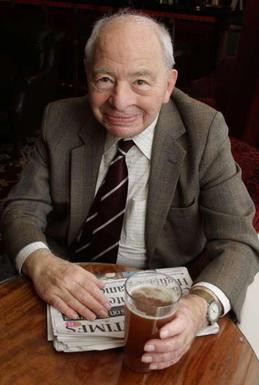Loading AI tools
English writer (1930–2017) From Wikipedia, the free encyclopedia
Norman Colin Dexter OBE (29 September 1930 – 21 March 2017) was an English crime writer known for his Inspector Morse series of novels, which were written between 1975 and 1999 and adapted as an ITV television series, Inspector Morse, from 1987 to 2000. His characters have spawned a sequel series, Lewis, from 2006 to 2015, and a prequel series, Endeavour, from 2012 to 2023.
Colin Dexter | |
|---|---|
 | |
| Born | Norman Colin Dexter 29 September 1930 Stamford, Lincolnshire, England |
| Died | 21 March 2017 (aged 86) Oxford, England |
| Occupation | Novelist |
| Alma mater | Christ's College, Cambridge |
| Genre | Crime fiction |
| Notable works | Inspector Morse series (1975–1999) |
| Spouse |
Dorothy Cooper (m. 1956) |
| Children | 2 |
Dexter was born in Stamford, Lincolnshire, to Alfred and Dorothy Dexter.[1] He had an elder brother, John,[2] a fellow classicist, who taught Classics at The King's School, Peterborough, and a sister, Avril.[3] Alfred ran a small garage and taxi company from premises in Scotgate, Stamford.[4] Dexter was educated at St John's Infants School and Bluecoat Junior School, from which he gained a scholarship to Stamford School, a boys' grammar school, where a younger contemporary was England cricket captain and England rugby player M. J. K. Smith.[2][5]
After leaving school, Dexter completed his national service with the Royal Corps of Signals and then read classics at Christ's College, Cambridge, graduating in 1953 and receiving a master's degree in 1958.[5]
In 1954, Dexter began his teaching career as assistant Classics master at Wyggeston Grammar School for Boys in Leicester. There he helped the school's Christian Union.[6] However, in 2000 he stated that he shared the same views on politics and religion as Inspector Morse,[7] who was portrayed in the final Morse novel, The Remorseful Day, as an atheist. A post at Loughborough Grammar School followed in 1957, then he took up the position of senior Classics teacher at Corby Grammar School, Northamptonshire, in 1959.
In 1966, he was forced by the onset of deafness to retire from teaching and took up the post of senior assistant secretary at the University of Oxford Delegacy of Local Examinations (UODLE) in Oxford, a job he held until his retirement in 1988.[8]
In November 2008, Dexter featured prominently in the BBC Four programme "How to Solve a Cryptic Crossword" as part of the Timeshift series, in which he recounted some of the crossword clues solved by Morse.[9]
The initial books written by Dexter were general studies textbooks.[10] He began writing mysteries in 1972 during a family holiday. Last Bus to Woodstock was published in 1975 and introduced the character of Inspector Morse, the irascible detective whose penchants for cryptic crosswords, English literature, cask ale, and music by Wagner reflected Dexter's own enthusiasms. Dexter's plots used false leads and other red herrings,[11] "presenting Morse, and his readers, with fiendishly difficult puzzles to solve".[12]
The success of the 33 two-hour episodes of the ITV television series Inspector Morse, produced between 1987 and 2000, brought further attention to Dexter's writings. The show featured Inspector Morse, played by John Thaw, and his assistant Sergeant Robert Lewis, played by Kevin Whately. In the manner of Alfred Hitchcock, Dexter made a cameo appearance in almost all episodes.
From 2006 to 2015, Morse's assistant Lewis was featured in a 33-episode ITV series titled Lewis (Inspector Lewis in the United States).[13] Lewis is assisted by DS James Hathaway, played by Laurence Fox. A prequel series, Endeavour, features a young Morse and stars Shaun Evans and Roger Allam. Endeavour was first broadcast on the ITV network in 2012, ending with the ninth series in 2023, taking young Morse's career into 1972.[14] Dexter was a consultant for Lewis and the first few years of Endeavour. As with Morse, Dexter occasionally made cameo appearances in both Lewis and Endeavour.[15]
Although Dexter's military service was as a Morse code operator in the Royal Corps of Signals, the character was named after his friend Sir Jeremy Morse, a crossword devotee like Dexter.[12] The music for the television series, written by Barrington Pheloung, used a motif based on the Morse code for Morse's name.[16]
Dexter received several Crime Writers' Association awards: two Silver Daggers for Service of All the Dead in 1979 and The Dead of Jericho in 1981; two Gold Daggers for The Wench is Dead in 1989 and The Way Through the Woods in 1992; and a Cartier Diamond Dagger for lifetime achievement in 1997.[8] In 1996, Dexter received a Macavity Award for his short story "Evans Tries an O-Level". In 1980, he was elected a member of the by-invitation-only Detection Club.[17] In 2005 Dexter became a Fellow by Special Election of St Cross College, Oxford.[18]
In the 2000 Birthday Honours Dexter was appointed an Officer of the Order of the British Empire for services to literature. In 2001 he was awarded the Freedom of the City of Oxford. In September 2011, the University of Lincoln awarded Dexter an honorary Doctor of Letters degree.[19][20]
In 1956, he married Dorothy Cooper. They had a daughter, Sally, and a son, Jeremy.[2][12]
On 21 March 2017 Dexter's publisher, Macmillan, said in a statement "With immense sadness, Macmillan announces the death of Colin Dexter who died peacefully at his home in Oxford this morning".[21]
Seamless Wikipedia browsing. On steroids.
Every time you click a link to Wikipedia, Wiktionary or Wikiquote in your browser's search results, it will show the modern Wikiwand interface.
Wikiwand extension is a five stars, simple, with minimum permission required to keep your browsing private, safe and transparent.